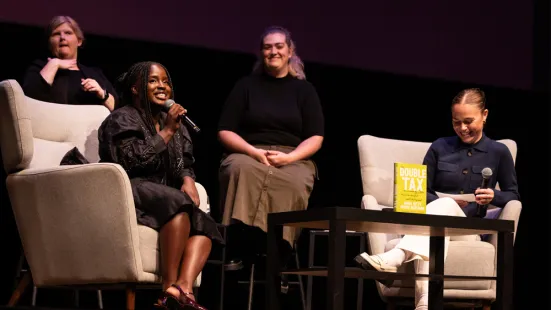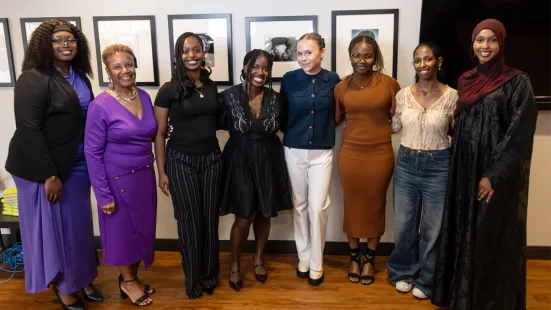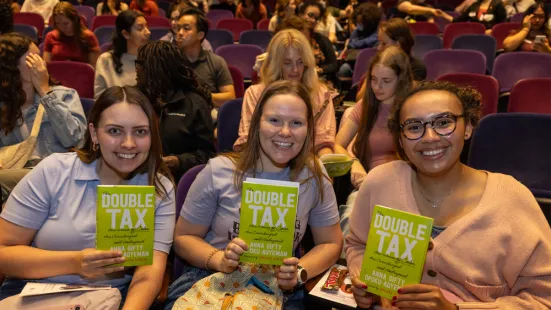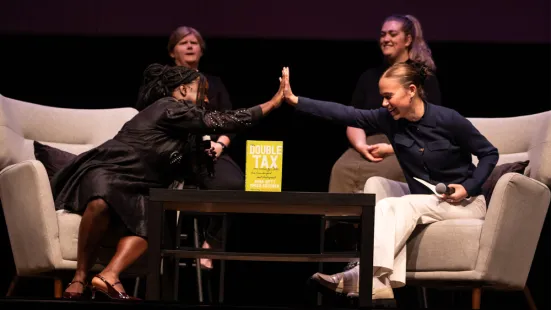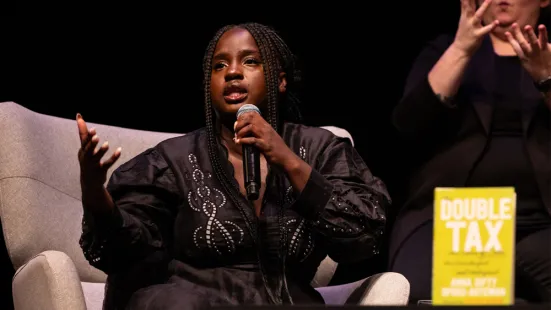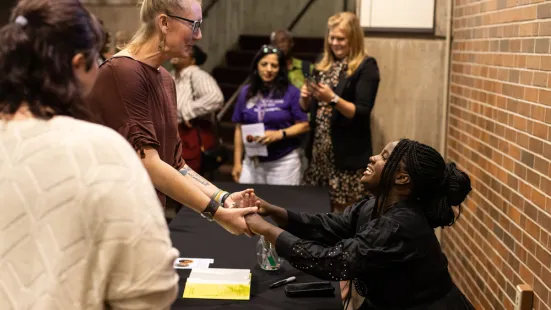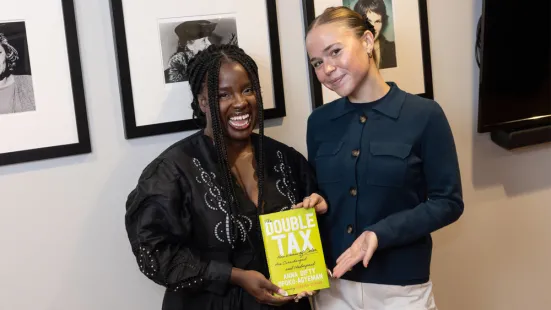On October 1, Anna Gifty Opoku-Agyeman brought her new book, The Double Tax: How Women of Color Are Overcharged and Underpaid, to The O’Shaughnessy at St. Catherine University. In a conversation moderated by Hope Walz — daughter of Minnesota Governor Tim Walz and an advocate for equity in her own right — Opoku-Agyeman discussed her book, which explores why it’s so expensive to be a woman in America and how these costs are further compounded by race. She explained how the “double tax” affects all different aspects of Black women’s lives — from the classroom and career, to beauty and style, to caregiving and motherhood.
A Ghanaian-American researcher and writer, Opoku-Agyeman is a doctoral candidate studying public policy and economics at the Harvard Kennedy School. The event was hosted by St. Kate’s Minnesota Center for Diversity in Economics (MCDE), Katie Leadership Impact (KLI), St. Kate's Bookstore, and the Office of Scholarly Engagement.
Introducing the event, President Marcheta P. Evans, PhD, told the audience that as a Black woman leader whose experience and expertise has often been discounted or underestimated, the book spoke to her in a personal way. “I also know the strength and resilience it takes to push through those barriers, and the profound joy of seeing doors open, not only for myself, but for those who will come behind me,” she said.
The double tax and career
Building off the concept of a “pink tax,” which refers to the additional costs that women face for products and services marketed toward them, Opoku-Agyeman’s book develops the idea of a “double tax” that takes into account the additional costs that women of color face. This double tax of racism and sexism is responsible for major gaps in access and opportunities between women of color and white women, and between women and men.
One effect of the double tax is that women of color are underrepresented among the highest paid careers in the United States. There are many interlocking factors contributing to this underrepresentation; one of them, as Opoku-Agyeman shared from her own experience, is that women of color are often discouraged early on in their educational journeys from pursuing higher paid but more difficult career paths, including in STEM fields. She told a story about meeting with an advisor who told her to aim for a master’s degree rather than a PhD in economics, and a high school teacher who tried to dissuade her from majoring in math in college because she asked too many questions, despite excelling in algebra.
“Those two conversations…were echoing the same sentiment, which is, ‘You don’t look like someone who can handle this,’” she said. “A lot of times Black women, women of color, I would even argue white women, our position in financial spaces [doesn’t] allow [us] to really see economic mobility all the way through. Ensuring that those career paths are also available to us is something I’ve taken personally on.”
Furthermore, over 300,000 Black women have exited the labor force this year — which should be a concern for us all, Opoku-Agyeman said, for both empathetic and economic reasons. “Black women’s experiences are sort of the rising tide that lifts all boats,” she said. “Think about all of our lived experiences as sort of overlapping experiences in our collective humanity. I would argue that Black women oftentimes fall dead center — they’re at the intersection of this really large Venn diagram. It means we have a really interesting vantage point when it comes to thinking about how inequality might manifest in your life, or in your life.”
The double tax and beauty
Opoku-Agyeman also talked about how the double tax manifests through beauty standards, using the example of hair and how expensive it can be to maintain hairstyles seen as acceptable or professional for Black women.
“Those costs, especially for Black girls, start to show up at a very young age,” she said. “During picture day, when you’re just trying to rock some beads, you can get policed by your own school’s standards of what professionalism looks like. But you learn really quickly what the double tax is in terms of beauty.”
She mentioned the reality TV show “Love Island” and noted how the appearances of Black women contestants on the show are often more heavily scrutinized than those of their white peers. Popular culture can amplify the effects of the double tax — though it also has the power to expand traditional, white-centered standards of beauty. Opoku-Agyeman shared how seeing darker skinned women like the actress Lupita Nyong'o celebrated for their beauty helped her feel more comfortable in her own skin.
To end, Opoku-Agyeman answered questions submitted by audience members, including one asking for advice to Black women. She encouraged listeners, especially those entering their first jobs, to discuss their salaries with their friends and not be afraid to ask for what they’re worth: “We should always be asking for more. Because they’re lowballing us, always. They’re always giving us less than what we deserve.”
Opoku-Agyeman added, “We desperately need to be in community. That’s our lifeblood. That means sharing resources, sharing job opportunities, and also just venting to each other about what we’re going through…It’s very healing to see people go through similar experiences.”
